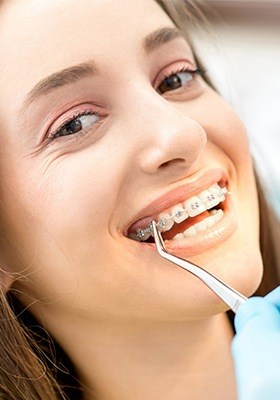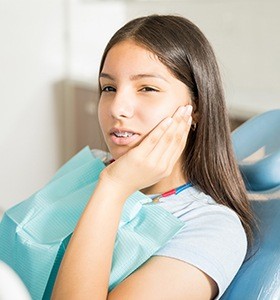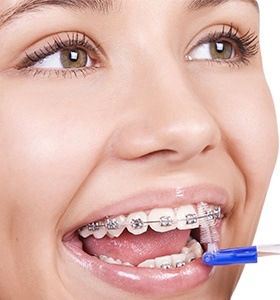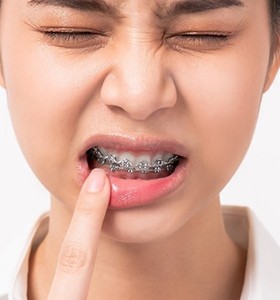
Orthodontic Emergencies — Jacksonville, FL
Fast Relief For Patients in Need

Please contact Ortega Orthodontics as soon as possible should you break or loosen any of your appliances. Call our orthodontic office before coming in so we can make the time to treat you properly. If you already have an appointment scheduled, please let us know that you will need repair during your visit. If you experience an orthodontic emergency outside of our office hours, contact our answering service, and we will get back to you as soon as possible. We provide fast relief for patients in need, so don’t wait to give us a call.
Why Choose Ortega Orthodontics for Emergency Orthodontic Care?
- Same-Day Emergency Appointments Available
- Experienced Orthodontist with Advanced Training
- Dental Insurance Welcome & Flexible Financing Available
What to Do in an Orthodontic Emergency

- Step 1: Call our office as soon as you can. We do everything we can to see emergency patients for a same-day appointment, so don’t wait to give us a call! Once you’ve been scheduled, one of our team members will walk you through what steps to take to manage your situation until you can reach our office.
- Step 2: See Dr. Holland for an emergency exam. When you arrive, your Jacksonville emergency orthodontist Dr. Holland will see you right away for an exam. Once he’s learned more about your emergency and provided any necessary pain relief, he’ll review his findings with you and explain your treatment options.
- Step 3: Get the fast, professional care you need. In most cases, we’ll be able to address your orthodontic emergency right away here at our office with a simple adjustment or replacement. In rare situations, we may recommend that you see your general dentist to treat an underlying oral health issue. Whatever your case calls for, we’ll help you get the care you need right away!
The Most Common Orthodontic Emergencies
It’s not always easy to tell if you’re experiencing an orthodontic emergency. We encourage you to give us a call if your orthodontics are broken or loose, if you’re experiencing a lot of oral pain, or if you have any other symptoms that are worrying you. When you give us a call, we’ll help assess your situation over the phone and determine how urgently you need to be seen. Then we’ll schedule your appointment and give you personalized first-aid instructions until you can reach us. Here’s some important information about handling a few of the most common orthodontic emergencies we treat:
Learn More About Handling Orthodontic Emergencies
What Are the Best Ways to Care for My Orthodontics At Home?

- Floss every day: Flossing is even more important when you have braces because it’s easier for food to become stuck on the appliance and the teeth. To make sure your teeth are completely cleaned, feed the floss through the space between the main arch wire and the upper part of each tooth.
- Consider investing in orthodontic toothbrushes: There are specialty toothbrushes that are actually designed specifically for braces, such as a proxy brush. They are a worthwhile investment to make sure your teeth remain healthy during your treatment, but it’s important that you use them consistently.
- Keep your retainer clean: When wearing a retainer, be sure to clean off any food debris every single day using a toothbrush and water. You can occasionally soak it in a denture cleaner as well – just be sure to rinse it with water before putting it back into your mouth.
How to Prevent Orthodontic Emergencies

A few simple habits are all you need to save yourself from having to make an unexpected trip to the orthodontist:
- Avoid eating chewy, sticky, or hard foods that could damage brackets or get stuck in wires.
- Wear a mouthguard every time you participate in sports.
- Brush and floss thoroughly every day. Nothing throws off orthodontic treatment like a cavity!
- Visit your dentist/orthodontist regularly so little problems can be fixed before they turn into an emergency later.
Orthodontic Emergency FAQs

Are you dealing with a broken braces bracket? Do you know what to do to avoid an orthodontic emergency? Do you know how to address the problem of losing your retainer? These are common questions answered by dentists and orthodontists all the time. To ensure you have all the information you need throughout your treatment and even after you’ve completed your time wearing braces, here are some frequently asked questions you can refer to. If you have additional inquiries or need to schedule an appointment, don’t hesitate to contact us.
When Should I Go to the ER for an Orthodontic Emergency?
Most orthodontic emergencies are easily managed by an orthodontist and their skilled team of professionals. From broken and loose brackets to soft tissue irritation and serious dental pain, you can expect to visit your local orthodontist’s office for help. However, if you experience severe facial trauma that results in a broken or fractured jaw, continuous bleeding from the mouth that does not cease after 15-20 minutes of applied pressure, or increased swelling around the mouth, jaw, or throat, you should get to your local emergency room for immediate medical attention.
Do I Have to See My Orthodontist Right Away?
When facing a dental emergency of any kind, it is always best to seek care as soon as possible, even if you believe it’s nothing serious. Oftentimes, when damage or injury occur, especially while wearing braces, you could be faced with a problem that is undetectable to the naked eye. It will take a skilled and trained professional to carefully examine your appliances and oral cavity to ensure there are no bent wires, loose brackets, or protruding pieces that could cause additional harm to your teeth and/or gums. Avoiding professional help could potentially lead to worsening problems that cause more time and money to be spent fixing the issue.
What Should I Do If I Have an Orthodontic Emergency While Traveling?
Don’t wait to seek help. Find a local orthodontist who can immediately get you in and offer timely and effective treatment. It is best if you address the problem sooner rather than wait until you return from your trip. This will not only allow you to enjoy the rest of your time away, but it will prevent additional problems from developing. You will need to make sure that you contact our office, though, to ensure we are informed of the injury. Based on the information you provide, we will be able to determine if you should come in for an exam after you return.
Will Dental Insurance Cover My Orthodontic Emergency?
All dental insurance companies are different, so how they handle orthodontic emergencies will be dependent upon your plan and any stipulations or exclusions stated within your policy. To know if your visit will be covered by insurance, make sure to contact an insurance representative and explain the situation. If you are unsure what to ask or how to handle the situation, feel free to ask a member of our dental team to work on your behalf.
Traditional Braces Clear/Ceramic Braces Lingual Braces (Incognito) Orthognathic Surgery Phase I Pediatric Orthodontics Invisalign® & 3M Clarity Aligners Dentofacial Orthodontics Orthodontic Appliances Adult Treatment View Our Services